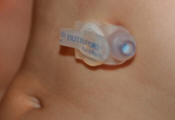By the time you are an adult with CF, you will have heard many times about the need to maintain a good body weight.
Diet definitely does matter. Achieving and maintaining a good weight helps to maintain good lung function, which can result in less time in hospital.
A healthy body mass index (BMI) for someone with CF is between 22 and 25.
Dietary requirements
A person with CF may need 120% to 150% of the calories needed by someone without CF. This is due to things like:
- difficulty absorbing the nutrients from food
- increased energy needed to fight infection
- reduced appetite when you are sick
- increased energy needed to breathe if you have lower lung function
- losing fat in your stools, especially if you do not take enough enzymes.
If you are having trouble gaining or maintaining weight, our dietitian can:
- give you tips on maximising calories in your diet
- review your enzyme use so you get the most out of the food you are eating
- advise you on high energy supplement drinks.
If you are still unable to reach an ideal weight, you can have a gastrostomy tube (PEG) inserted to supplement your food intake.
A PEG can be used during the day or for overnight feeding while you sleep. It is used to supplement your food intake, not to replace what you usually eat.
How PEG tubes are put in

PEG tube
PEG tubes are usually put in by a specialist team in the Gastroscopy Day Unit. While you are sedated, the tube is placed into your stomach through the abdominal wall. You will have a longer tube in place until the incision site heals — usually about 6 to 8 weeks.
The long tube is then replaced with a low profile “button” as shown in the picture. Using a connecting tube, supplement drinks or feeds can go straight into your stomach.
Most people will use their PEG tube on a daily basis, or several times a week. When you have achieved your target weight, you may only use it as a back up if you get sick or lose weight.
If you think a PEG may be helpful for you, or are interested in finding out more, ask one of the CF team for more information.
Probiotics for cystic fibrosis
Probiotics may be helpful for people with antibiotic associated diarrhoea.
There are many different types of probiotics — some may be more helpful than others. Speak to us before starting them. They are generally safe and well tolerated but are not recommended in people who are immunocompromised, for example CF patients following lung transplant.
Currently in Canterbury the Cystic Fibrosis Association will fund short term probiotics if requested by the CF team. It is best to start probiotics at the same time as antibiotics.
